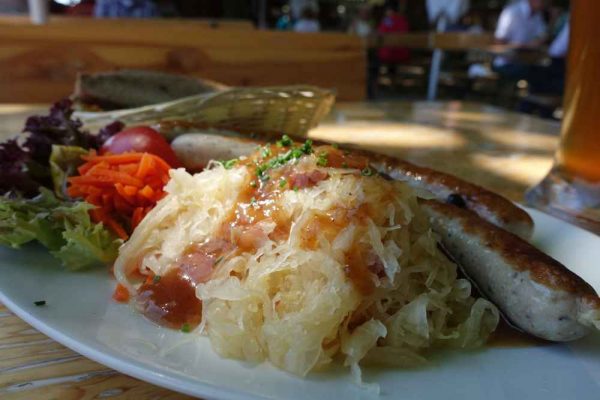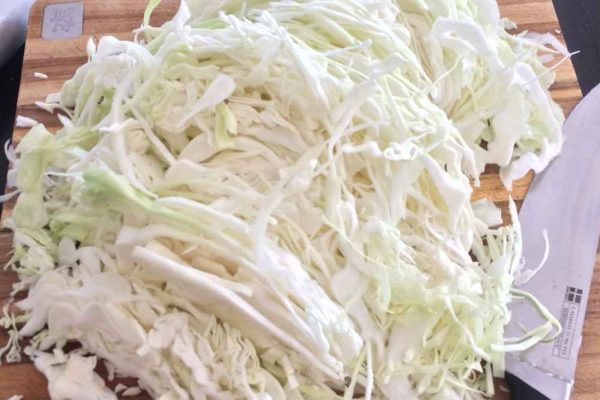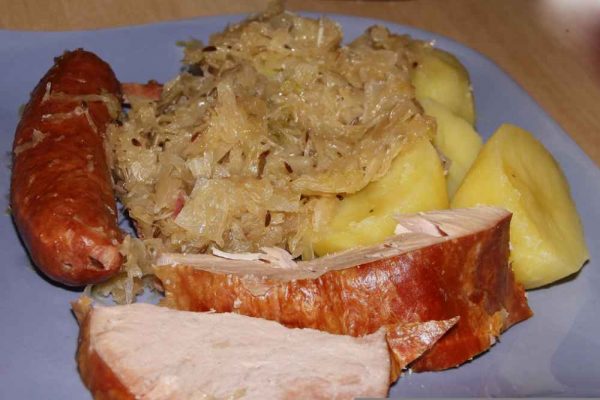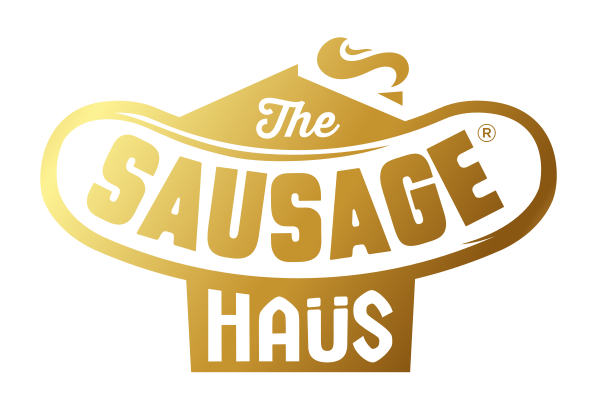Few foods capture the essence of German cuisine like sauerkraut — that crisp, tangy, fermented cabbage loved for centuries across Europe. In Germany, sauerkraut isn’t just a side dish; it’s a national icon, a symbol of hearty cooking, good health, and timeless tradition.
Here in the UK, sauerkraut has made its way onto pub menus, food stalls, and barbecue spreads. From a hot dog topped with kraut and mustard to a steaming plate of bratwurst and sauerkraut, this humble dish continues to delight anyone who loves bold, balanced flavours.
At The Sausage Haüs, we know exactly why sauerkraut belongs beside every great German sausage. It’s the natural companion to frankfurters, bratwursts, and smoked krakauers — a perfect marriage of tangy freshness and savoury richness that transforms simple sausage dishes into authentic German experiences.

What Is Sauerkraut?
The word sauerkraut literally translates to “sour cabbage.” It’s made by finely shredding fresh white cabbage, adding salt, and allowing it to ferment naturally over several weeks. During this time, natural bacteria (lactic acid bacteria) convert the sugars in the cabbage into lactic acid, giving sauerkraut its distinct sour flavour and crunchy texture.
Unlike pickled cabbage, authentic German sauerkraut doesn’t rely on vinegar. The acidity develops naturally, which is why it’s also known as a fermented cabbage dish — rich in probiotics, vitamins, and minerals.
In Germany, making sauerkraut is a cherished tradition that dates back over 2,000 years, and it remains one of the most popular preserved foods in the country today.
A 2,000-Year-Old Tradition
Although fermented cabbage was first recorded in ancient China, it was the Germans who perfected the craft and made sauerkraut a culinary staple. For centuries, it served as a reliable source of vitamins through the long winters, especially vitamin C, which helped prevent scurvy among sailors and farmers.
Each German region has its own twist — from Bavarian-style sauerkraut with a hint of caraway seed to the milder, wine-infused varieties of the Rhineland. But one thing is universal: it’s a cornerstone of German food culture, appearing at Oktoberfest celebrations, Christmas markets, and family dinners year-round.
How Authentic Sauerkraut Is Made
Traditional sauerkraut starts with nothing more than cabbage and salt. The cabbage is shredded, salted, and pressed into fermentation crocks. Over time, the natural bacteria create a safe, acidic environment where flavours deepen and textures stay crisp.
The result is a food that’s:
- Naturally preserved
- Full of probiotics for gut health
- Rich in vitamin C, K, and B-vitamins
- Low in calories but packed with nutrients
This process hasn’t changed much in centuries — which is why real German sauerkraut tastes so different from the mass-produced vinegar-based versions found in many supermarkets.

Is Sauerkraut Healthy?
Absolutely. In fact, sauerkraut is one of the healthiest fermented foods you can eat. It supports digestion, improves gut flora, and boosts the immune system.
Here’s why:
- The live cultures formed during fermentation act as natural probiotics.
- The lactic acid helps balance intestinal bacteria.
- It’s naturally gluten-free, vegan, and low in calories.
That’s why modern nutrition experts have embraced sauerkraut once again — not only as a cultural food, but as a functional superfood.
At The Sausage Haüs, we believe it’s the perfect way to add both nutrition and tradition to any German sausage dish.
Sauerkraut and German Sausages: A Perfect Pair
No discussion of sauerkraut is complete without mentioning its most famous companion — the German sausage.
Across Germany (and increasingly in the UK), bratwurst and sauerkraut are inseparable. The sharp tang of sauerkraut cuts through the richness of the sausage, while the warmth of the meat brings out the kraut’s delicate aroma.
Here’s how different sausages pair beautifully with sauerkraut:
Bratwurst with Sauerkraut
The ultimate combination. The lightly spiced pork of a bratwurst balances perfectly with the acidity of sauerkraut. In southern Germany, this pairing is often served with mustard and fresh bread or potatoes.
Frankfurter with Sauerkraut
This is the classic you’ll find at every German market. Whether tucked into a bun or served on a plate, frankfurter and sauerkraut is the essence of simple perfection — smoky, juicy, and refreshing all at once.
Krakauer or Bacon Frankfurter
For those who love bold flavours, pair spicy, smoked sausages with sweet Bavarian-style sauerkraut. The chilli heat contrasts beautifully with the mild sourness.
Cheese Frankfurter and Sauerkraut Hot Dog
Sauerkraut makes a perfect hot dog topping. Its tangy bite complements creamy cheese and smoky meat — ideal for street food or festival menus.
When people ask “What to eat with bratwurst?”, the answer is easy: authentic German sauerkraut.
How to Serve Sauerkraut
Sauerkraut is incredibly versatile. You can serve it cold, warm it gently, or even cook it with apples, onions, and spices for a more complex flavour.
Here are some serving ideas:
- Traditional Style: Warm sauerkraut with caraway seeds and juniper berries, served beside bratwurst and mustard.
- BBQ Style: Grilled sausages on a bun, topped with sauerkraut, onions, and spicy mustard — the perfect German hot dog topping.
- Modern Twist: Mix sauerkraut into salads or grain bowls for a probiotic boost.
- Pub Menu Favourite: Add a small side of sauerkraut to pork schnitzel or pulled-pork sandwiches.
The key is not to overheat sauerkraut — warming it gently preserves its crunch and natural probiotics.

Sauerkraut in German Culture
Sauerkraut isn’t just food; it’s identity. The phrase “Kraut”, once used as slang for Germans, came from the worldwide fame of this humble dish. It’s served at Oktoberfest, family meals, and national holidays.
It symbolises honesty, tradition, and quality — values that define German sausage suppliers like The Sausage Haüs. That’s why we proudly pair sauerkraut with our range of authentic German sausages, bringing both elements of this cultural heritage to UK tables.
Where to Buy Authentic German Sauerkraut in the UK
Many supermarket versions of sauerkraut are pasteurised or made with vinegar, losing much of the flavour and probiotic benefit. For the real thing, choose sauerkraut made in the traditional German way — naturally fermented, unpasteurised, and full of crunch.
You can find authentic German sauerkraut through specialist importers and German sausage suppliers like The Sausage Haüs, who deliver premium-quality German foods to caterers, restaurants, and consumers across the UK.
We believe great sauerkraut deserves great sausages — which is why we recommend pairing it with our:
- Smoked Pork Frankfurters
- Emmental Cheese Frankfurters
- Chilli Bacon Frankfurters
- Jumbo Hotdogs
- Sundried Tomato & Cheese Frankfurters
Each one brings out a different side of sauerkraut’s unique tang.
Modern UK Sauerkraut Trends
Interest in fermented foods is exploding. British consumers are rediscovering sauerkraut as a health food, a gourmet side, and a vegan-friendly ingredient.
You’ll now see it on:
- Gourmet hot dogs at street food stalls
- Pub menus beside bratwurst and pork dishes
- Deli counters with cured meats and cheeses
- Healthy cafés offering probiotic bowls and sandwiches
By publishing quality articles on sauerkraut, The Sausage Haüs positions itself as both a supplier and a trusted authority on authentic German cuisine — connecting centuries of tradition with modern tastes.
Conclusion: The Soul of German Flavour
Few combinations are as iconic as German sausages and sauerkraut. One brings smoky depth, the other bright acidity — together they create balance, comfort, and tradition on a plate.
At The Sausage Haüs, we’re proud to celebrate both sides of this culinary heritage. Our sausages follow authentic German recipes, smoked over beechwood for perfect flavour, while sauerkraut remains their timeless companion — crisp, tangy, and full of life.
So whether you’re planning a barbecue, an Oktoberfest event, or a cosy winter supper, remember: great sausages deserve great sauerkraut.
Taste the authentic German combination.
Taste The Sausage Haüs difference.
Frequently Asked Questions About Sauerkraut
Yes! In fact, raw sauerkraut retains more probiotics. You can eat it straight from the jar or lightly warm it for traditional dishes like bratwurst and sauerkraut.
Yes, it’s easy! Simply shred white cabbage, mix it with 2% salt by weight, and press it tightly into a jar or crock so the brine covers the cabbage. Seal and leave it at room temperature for 1–3 weeks. The result is homemade fermented cabbage that’s crunchy, tangy, and full of life.
You can gently heat sauerkraut, but avoid boiling it. High heat destroys its probiotics and crisp texture. Warm it in a pan with a little butter, onion, or apple for a traditional German-style side dish. For sausages, lightly warmed sauerkraut adds aroma and keeps the authentic bratwurst and sauerkraut pairing intact.
Unpasteurised sauerkraut can last for months if stored in its brine and kept cool. Once opened, seal tightly and refrigerate to maintain freshness. Pasteurised sauerkraut lasts less time, as the heating process kills the live cultures that preserve it naturally.
Sauerkraut originated in ancient China but became a staple of German cuisine during the Middle Ages. Poland also has its own version, often with carrots or apples, but the classic German sauerkraut is pure cabbage and salt, fermented naturally.
Yes — it’s one of the best natural sources of probiotics. Regular consumption can support digestion, reduce bloating, and improve overall gut balance. Fermented foods like sauerkraut also enhance nutrient absorption and help maintain a healthy immune system.
No — pickled cabbage is preserved in vinegar, while sauerkraut ferments naturally through lactic acid bacteria. That fermentation process gives sauerkraut its probiotic benefits and more complex flavour. Pickled cabbage tends to be sharper, while sauerkraut is milder and naturally sour.
Yes — traditional sauerkraut is both vegan and gluten-free. It contains only cabbage and salt, making it a safe and flavourful choice for most dietary needs. Be cautious with pre-flavoured varieties, as some may include additives, wine, or sausage drippings.
Bratwurst is the most traditional choice, but frankfurters, krakauers, and cheese sausages also pair beautifully. The tangy flavour balances the smoky richness of any German sausage, making it a perfect side for BBQs or Oktoberfest-style meals.
Look for trusted German sausage suppliers like The Sausage Haüs, who specialise in traditional German products. Authentic sauerkraut should be naturally fermented, not made with vinegar, and ideally unpasteurised. You can also find it in selected delis, online German shops, or paired with our range of frankfurters and bratwursts for the full German experience.



